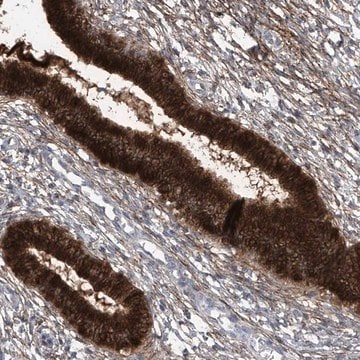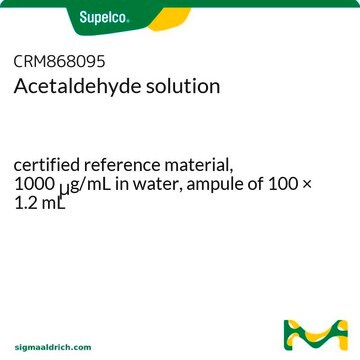868095
Acetaldehyde solution
1000 μg/mL in H2O, analytical standard
About This Item
Produits recommandés
Qualité
analytical standard
CofA (certificat d'analyse)
certificate of analysis is enclosed in each package.
Conditionnement
ampule of 100 × 1.2 mL
Concentration
1000 μg/mL in H2O
Technique(s)
HPLC: suitable
gas chromatography (GC): suitable
Densité
0.868 g/mL at 20 °C
Format
single component solution
Température de stockage
2-8°C
Chaîne SMILES
[H]C(C)=O
InChI
1S/C2H4O/c1-2-3/h2H,1H3
Clé InChI
IKHGUXGNUITLKF-UHFFFAOYSA-N
Vous recherchez des produits similaires ? Visite Guide de comparaison des produits
Application
Autres remarques
Remplacé(e)(s) par
Mention d'avertissement
Danger
Mentions de danger
Conseils de prudence
Classification des risques
Carc. 1B
Code de la classe de stockage
6.1D - Non-combustible acute toxic Cat.3 / toxic hazardous materials or hazardous materials causing chronic effects
Classe de danger pour l'eau (WGK)
WGK 3
Point d'éclair (°F)
Not applicable
Point d'éclair (°C)
Not applicable
Équipement de protection individuelle
Eyeshields, Gloves
Faites votre choix parmi les versions les plus récentes :
Déjà en possession de ce produit ?
Retrouvez la documentation relative aux produits que vous avez récemment achetés dans la Bibliothèque de documents.
Les clients ont également consulté
Notre équipe de scientifiques dispose d'une expérience dans tous les secteurs de la recherche, notamment en sciences de la vie, science des matériaux, synthèse chimique, chromatographie, analyse et dans de nombreux autres domaines..
Contacter notre Service technique










